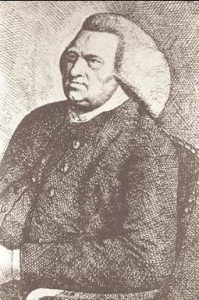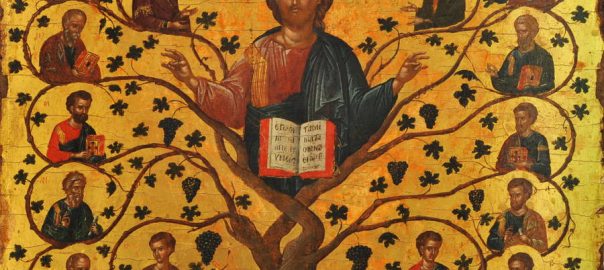
More on James Relly.
James Relly’s theology revolved around the idea of the eternal union between Christ and his church. Christ is united to His Church to such a degree that Christians have already died with him on the cross. Everything which can be said about Christ can be said of those who are united with him.
In this way the sin of sinners are rightly punished in Christ. God does not judge and punish Christ instead of sinners (in the sense that sinners are not subject to judgment), but he judges sinners in Christ. Through their union with Christ sinners are simultaneously judged and counted righteous as they also participate in Christ’s perfect righteousness. This is union is eternal as a result of election, and realized in the incarnation.
“[U]nion of Christ, and his Church, hath been of old, before faith, before time: and remains to be indissolvable , and unchangeable.” (Relly, Union, p. 117)
Faith is not the condition of this union, but a knowledge of the fruits of the union with Christ. Faith is a knowledge of the identity the believer already has in Christ before coming to know this through faith. No inner, spiritual rebirth or conversion need to take place to create this union with Christ, which is true even before conversion. It is the faith of Christ that justifies sinners, not their own faith, which is always unstable and weak.
See also: James Relly: “Has he fulfilled all righteousness? So have we. Is he justified? So are we.”
Relly developed the core aspects of this idea in his Union: or, a Treatise of the Consanguinity and Affinity between Christ and his Church from 1759. The doctrine of union later became pivotal in the development of Relly’s universal soteriology, as he came to believe that the whole humankind was united to Christ in this way. The unsaved who do not yet have faith are those who do not yet know, that they are already united with Christ and thus also participate in his death and resurrection whereby they are made righteous before God.
Btw.: If Relly’s doctrine of union sounds like Karl Barth’s doctrines of election and justification, it’s because they are virtually similar, as far as I can tell. Barth similarly emphasizes the death that humankind dies with Christ on the cross in whom all are simultaneously rejected and elected. In Christ we are what we are not. More on this later.
Below are some excerpts from Relly’s book.
“What is impossible with Man, is possible with God. If we read the Scriptures out of Christ, they require impossibilities of us: hence it is, that some who are aware of this, and yet ignorant of the power of God, are obliged to have recourse unto new Laws; Laws of their own making, where, by a sincere intention, and all possible Obedience, they would evade the force of the scripture perfection, and put a foil upon the sword of the spirit: But truth needs no artifice, unto this sword, unfoiled, sharp, and two-edged as it is, piercing through the soul and spirit, joints, and marrow, discerning the thoughts, and intents of the heart, Jesus bared his Bosom: and sheathing it in his own Heart’s Blood, the divine, glutinating power thereof, hath rendered it impossible to draw it again to another execution; God is Just, and true, and will not; Men or Devils cannot.” (Union, p. 150)
“When we read the Scriptures in Christ, we determine according to the possibility of things with God, unto him who believeth, all things are possible. The impossibilities, and Jarrings, with which the Letter abounds: such as the demands of perfect obedience, of satisfaction for sin, of salvation by Grace, by Works, of the forgiveness of Sin by Christ, and yet Judged according to the Deeds done in the Body, and giving an account at that day for every idle word, &c. all this, I say hath its harmony and perfection in Jesus […] in him, as the representative of Man as having the people in himself, and he in them, the preceptive part is fulfilled perfectly;- And all the threatenings executed upon the Sinner, in him: in Him saved by Grace, in Him Justified by works, accepted in Him, having redemption in His Blood the forgivenness of sin. Our account for the idle word, is, that in ourselves we are carnal, sold under sin, and have no good thing; but, that in Christ we are fulled, in him sanctified, in him accepted, and therefore appeal from the first Adam, unto the second.” (Union, p. 150-152)
“Again, from the Grace and truth of Union, the Christian hath a right to reckon of Himself, of his state, and condition towards God, according to Christ; according to the state and Condition which He is in: hence saith the Apostle, reckon ye yourselves to be Dead indeed unto sin, but alive unto God through Jesus Christ our Lord (Rom. 6:11). And O (what grace is this!) that we helpless worms, whose every word, work, and thought is unholy, yea, in whom according to the strongest testimony of our senses, and reason, there is yet found the motions, life, and love of sin; should have a right to reckon ourselves dead unto sin: dead unto what we yet feel the life of, dead unto what we yet feel the love of, dead unto what is yet stronger than we, and against which, our utmost efforts when compared with its strength, are feebleness itself; it esteems all our Iron as straw, and our Brass as rotten wood; and, yet to reckon ourselves dead unto this, what an amazing reckoning it is! Yea, not only dead unto sin, whereby we are exempted from its filfth, guilt, and condemnation:- But we are to reckon ourselves positively Holy, Righteous, and fruitful, Alive unto God! and that in Opposition to all we see, feel, or understand of ourselves, according to sense. What are we then to reckon of ourselves by? by Jesus Christ our Lord;” (Union, p. 153)
